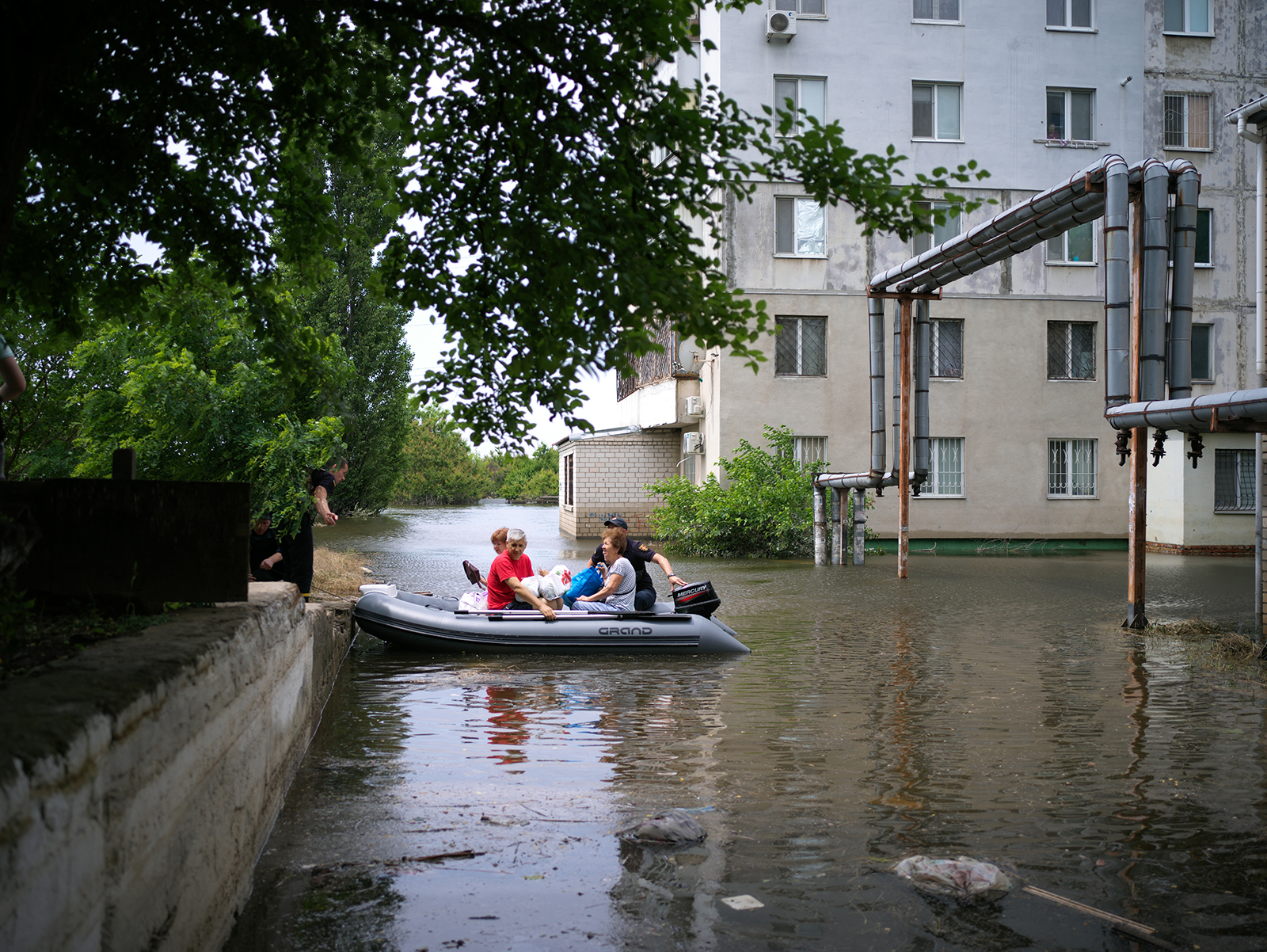The ravages of Russia’s brutal war in Ukraine are nothing less than ecocide. As the Commander in Chief and under the doctrine of command responsibility, Vladimir Putin is accountable for the acts of the Russian armed forces, who have unleashed grave and potentially irreversible harm on the environment of Ukraine. His war is jeopardising the social and economic benefits anticipated from Ukraine’s nature for the good not only of Ukraine but also for our global commons. In doing so, Putin marches against the tide of legal progress, international norms, human nature and the concept of security.
Identifying ecocide
The definition of ecocide was put forward in 2021 by the Independent Expert Panel, which was brought together to determine the legal definition of the crime applicable under international law. It comprises ‘unlawful or wanton acts committed with knowledge that there is a substantial likelihood of severe and either widespread or long-term damage to the environment being caused by those acts’. This crime, if adopted by the International Criminal Court, would become only the fifth international crime of the ICC’s Rome Statute, meaning it could be brought to court by any country that is a signatory of the statute, albeit not for retrospective crimes. As it stands, this definition has been agreed by the EU and some fourteen other countries to date.
President Zelenksy, who was educated in law and has a prescient talent for corralling the public Zeitgeist, has had the strategic foresight to include ecocide as one of the ten points of his Peace Plan. By calling for its prosecution, Zelensky has opened up a vital pathway to tackling the clear and present danger of ecocide. Until this step, the pathway to prosecution had eluded the growing number of advocates of ecocide’s legal recognition, but now a way ahead is unfolding like stepping stones in the fog of war.
With the renewed invasion of Ukraine in February 2022, several of Ukraine’s most prominent environmental NGOs, as well as international collaboration platforms such as Ecodozor, have been cataloguing and monitoring cases of potential negative environmental damage caused by Russia. As of this February, over 1,500 serious cases have been documented in Ecoaction’s environmental war map. Many thousands more cases of damage are logged with the Ministry of Environmental Protection and Natural Resources of Ukraine, their financial cost represented on their dashboard EcoZagroza.

The destruction of the Nova Kakhovka dam in Kherson oblast on 6 June 2023 caused massive flooding in the region on both sides of the Dnipro river. Image via EU Civil Protection and Humanitarian aid.
Some of the most egregious cases include: the deliberate bombing of the Kakhovka Dam, which has additionally threatened the safety of the Zaporizhzhia nuclear plant by depriving it of water to cool the reactor cores and spent fuel; damage to the Black Sea marine environment with dolphins dying in their hundreds; and the torching of fields and silos of wheat and grain, which had not already been stolen through illegal shipping transfers. These are the cases that make international headline news. In addition, there is the pollution and chemical damage from indiscriminate shelling, industrial targeting and wanton burning of sites. More insidious still is the growing military and industrial exploitation of pristine protected land and forests in the Donetsk and Luhansk regions, which is funding Russia’s engine of war.
By June 2022 the Ukraine War Environmental Consequences Working Group (UWEC), a body that includes the Ukrainian Ministry of Environmental Protection and Natural Resources, had been set up. Its aim is to start analysing and disseminating environmental damage assessments to inform eventual reparations and green reconstruction. At an international level, the Council of Europe passed a resolution in May 2023 to establish the Register of Damage for Ukraine (RD4U), which held its inaugural meeting in December 2023. In the coming months, RD4U will develop the rules and regulations of the Register to facilitate accepting damage claims as of spring 2024. The categories of claims are due to include environmental damage.
Meanwhile, legislative revisions around the world are pushing the boundaries of legal norms, expanding our understanding and responsible governance of the very ecosystems that sustain us. The world watches as, while fighting a war, Ukraine is forced to test these new principles which will set a precedent for the future.
With environmental crime already in the world, the environmental damage wrought by war will further exacerbate the possibility of eco-societal collapse. The EU revision of its Directive 2008/99/EC Protection of the Environment through Criminal Law aims to correct this imbalance by strengthening the list of offences, means of investigation and the penalties to be pursued. Many other nations are going further, acknowledging the severity of environmental crime as ecocide and seeking ecocide’s inclusion in the Rome Statute of the International Criminal Court as the fifth international crime.
Existing safeguards
Some protection already exists within the laws of war. According to the Geneva Convention, ‘it is prohibited to employ methods or means of warfare which are intended, or may be expected, to cause widespread, long-term and severe damage to the natural environment.’ This clause has until now had little international or even national traction. The only significant international penalties for causing environmental damage were in UN Security Council Resolution 687 forcing Iraq to pay reparations to Kuwait for damages caused by Iraq’s 1990 invasion, including US$14.7 billion for setting Kuwait’s oil wells alight. With Russia still on the UN Security Council, the chances of a similar outcome for the current violations are unlikely without any of the long-debated reform of the UN Security Council coming to pass.
Both Russia and Ukraine have extensive laws protecting the environment, including at a constitutional level. Russia’s Constitution stipulates that ‘everyone shall have the right to favourable environment, accurate information about its state and for a restitution of damage for any harm inflicted on his health and property by ecological transgressions’ (Article 42). Additionally, ‘everyone shall be obliged to preserve nature and the environment, carefully treat the natural wealth’ (Article 58). Russia has been directly or indirectly related to environmental protection, hailing back to Soviet perspectives when economic and social rights were deemed more important than individual rights. Its 2001 Federal Law on the Protection of the Environment is extensive, including the requirement to pay damages, implement the precautionary principle and prioritize ecosystem preservation.
Advances in law and weapons
Ukraine also has considerable environmental legislation and is rapidly revising its legal enforcement system. The country is using its goal of integration with the EU to deliver on the gaps in its legislation to meet the demanding EU Acquis, including Chapter 27 dedicated to the environment with its ‘polluter pays’ principle. Extensive debate and analysis are ongoing regarding how best to prosecute Russia for environmental damage. This is spurring discussions worldwide on the role of war in today’s climate-ravaged ecosystem, and how jus post bellum is as much a consideration in prevention as in the act of war. One new tool that might become available is using the fees collected from the EU’s new Carbon Border Adjustment Mechanism (CBAM) on Russian imports into the EU.
The case for reparation of environmental damage is gaining force. Climate litigation against corporations and government grows each year, as with UNSCR 687 on the reparation of damages for the Iraqi invasion of Kuwait. The spectre of ecocide in Ukraine is a call to the global community to seriously consider not only how the prosecution of war crimes must now include reparations for environmental damage but also the need for low carbon warfare in a world that still resorts to military solutions. So-called military realists frequently deride low carbon warfare. However, there are clear advantages in logistics, supply and heat signature through reducing fossil fuel use. Ukraine has pioneered this approach through the use of cyberhacking, drones and even agile ‘electric cavalry’ motorbikes, whose quiet motors and zero smell give battlefield advantages over traditional battle transportation. Moreover, there is a higher moral argument for a lighter footprint and less damage to civilian infrastructure. With emissions in the equation for a just world for future generations, there is an important case to be made for including the forced CO2 emissions of the defensive side through paying for net-zero sustainable reconstruction. Anything less is incompatible with the environmental crisis in front of us.
The debt of ecocide
Ukraine is a microcosm of the forces at play in the climate crisis, with its desire to leapfrog to green reconstruction representing a bright future of the first sustainable generation. It needs all the assistance possible to endure and win, as our beacon of hope, against global climate destruction. We must not simply stand by as good people who do nothing in this battle. We must ensure the debt incurred by destruction is paid.
On the Ides of March, the seventy fourth day of the Roman calendar, debtors in the Roman Empire had to pay their dues. Putin, with his debts of war against humanity and against the inextricable and inviolable rights to, and obligations toward, the ecosystem that sustains us, should be held accountable. As in the Roman Empire, a day of reckoning for Putin will come. As a man paranoid about the significance of calendar dates, being wary of how Caesar paid the ultimate personal price of his own life on the Ides of March should resonate.
Slava Ukraini.
The original version of this article was published in London Ukrainian Review in its first issue on the theme of ‘War on the environment’.





